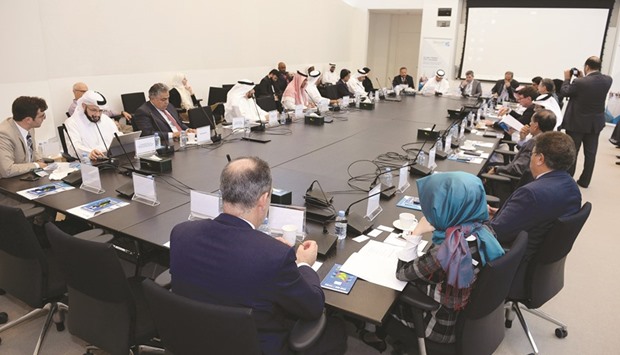The College of Islamic Studies at Hamad Bin Khalifa University (HBKU) yesterday held its annual Islamic finance CEOs’ roundtable on the role of Islamic finance in financing infrastructure projects.
The event brought together Islamic finance and economics representatives from industry and academia to understand on-the-ground realities and challenges, work together to reduce barriers to accessing Islamic finance, create more sustainable and ethical Sharia-compliant products, and encourage a more robust economy that meets the needs of all segments of society.
The topics of discussion and organisation of the event was prepared by the Centre for Islamic Economics and Finance at the college, with HE Sheikh Abdullah Saud al-Thani, governor of Qatar Central Bank, providing the keynote address.
Those in attendance included CEOs, senior advisers, and directors of major financial institutions in Qatar and from across the GCC region. Academics from HBKU and its partner universities also participated in the roundtable, as well as a number of HBKU Islamic finance
master’s students.
In his welcome remarks, Dr Ahmad M Hasnah, president, HBKU, said ‘the institution stands behind knowledge generation and knowledge discourse, and it is important to engage relevant stakeholders on the local, regional, and
international scene.’
HE Sheikh Abdullah said Islamic banking has seen rapid development and success over recent years and according to the Arab Monetary Fund’s latest estimates for 2016, the industry’s assets value surpassed $1tn and the estimated number of Islamic institutions is around 700 firms, of which 250 are operating in the Gulf region.
The CEOs’ roundtable initiative was launched to be a catalyst in opening communication channels between Islamic financial institutions and academia, creating an open forum to discuss new issues and products in the industry.
The event began with a discussion on the challenges that infrastructure project sponsors and governments face in utilising Islamic finance and highlighted ways in which Islamic finance can potentially help achieve infrastructure-related Sustainable Development Goals in the Muslim world.
Participants discussed issues such as improving access to affordable, reliable and modern energy service, ensuring availability of water and sanitation for all, and substantially increasing health and education financing.
Roundtable attendees were also invited to give an overview of their activities in arranging or participating in infrastructure projects partially or fully funded by Islamic finance, noting common modes of financing and mentioning notable case studies.

Officials from various Islamic finance organisations at the roundtable hosted by HBKU yesterday.
